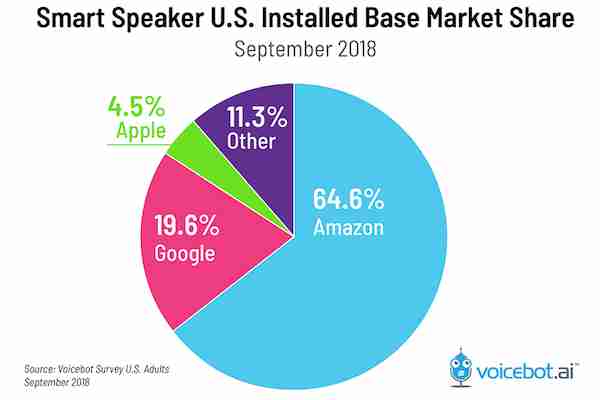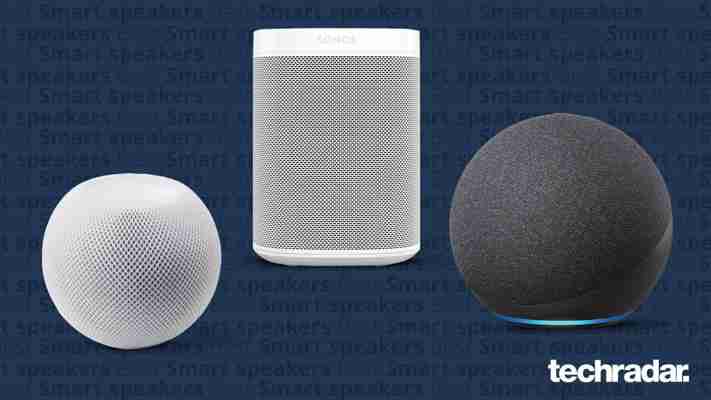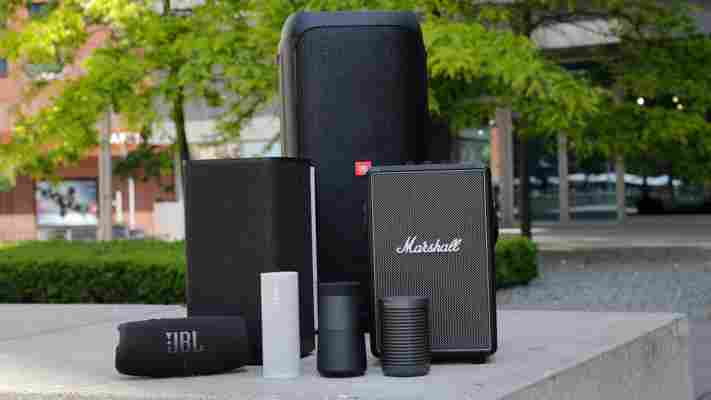
Amazon Maintains Smart Speaker Market Share Lead, Apple Rises Slightly to 4.5%

A national survey of 1,040 U.S. adults earlier this month commissioned by Voicebot, RAIN and PullString shows that Amazon is maintaining its lead in smart speaker installed base despite Apple and other device makers gaining some traction with users. Amazon Echo device share stands at 64.6% with Google Home products is use by 19.6% of smart speaker owners. Apple HomePod has been adopted by 4.5% of smart speaker owners while 11.3% say they have access to a smart speaker that is not made by Amazon, Google or Apple. However, all of those “other” devices have either Amazon Alexa or Google Assistant as the resident voice assistant so Amazon and Google’s influence extends well beyond their own smart speakers.
Apple HomePod Establishes Smart Speaker Market Share Beachhead
Despite complaints about limited Siri functionality and the HomePod’s high price, Apple seems to have made solid progress entering a market with strong incumbents. There have been reports of underwhelming sales volume, but success may depend on what you expected. The survey data suggests over 2.5 million consumers have acquired a HomePod even though it missed the holiday shopping period.
Apple has its big annual hardware event scheduled for today and that is expected to focus primarily on the new iPhone and Watch. However, it would be a good time to showcase advances in Siri or other HomePod features to offer consumers a rationale for making a holiday purchase. Siri shortcuts are sure to be highlighted on iPhone and they could also be extended to HomePod to implement smart home routines. Earlier reports suggest we are likely to see HomePod calling, multiple timers, calendar and find-my-iPhone features rolled out soon. Today would be a good day to showcase those updates.
Adding Spotify access would be an interesting move that may entice more users to purchase, but the exclusivity of Apple Music has some advantages for the company’s overall strategy. So, expect to see more of Siri if there is any movement toward highlighting HomePod. There is the potential for the introduction of a HomePod Mini or Beats-branded smart speaker at a lower price point but that seems like a long-shot. Either way, Apple entered the market late and has carved out a reasonable position in the market and even some leadership in the premium segment. It’s not an Apple-style home run so far, but it’s early and not a failure.
Smart Speaker Market Share Settling into Familiar Pattern
The latest smart speaker market share data are beginning to depict a familiar pattern. Amazon maintains a leadership position in the U.S. based on its first-to-market advantage and the strength of its marketing channel and Prime membership base. Everyone else is growing at Amazon’s expense. Amazon would need to capture two-thirds of all new smart speaker sales to maintain share and unit sales figures suggest that is not happening. In addition, Amazon has the added challenge of Sonos being a very popular Alexa-based smart speaker. There are benefits for Amazon to have Alexa distribution through other devices, but it invariably displaces Echo smart speaker sales. With that said, Amazon smart speaker sales did well over the summer likely driven by Prime Day promotions.
The real battle is about shape up. New hardware is expected from Amazon, Google, Samsung and others. Those new products will be the real catalyst that determines smart speaker market share after the holiday shopping season.
Keep in mind when you read these reports what they are calculating. The data here represents the installed base. CIRP data from earlier this summer also measures installed base, but it does not account for devices that are not manufactured by Amazon, Apple or Google. So, each of their market share figures are likely to be higher because the are comparing market share relative to each other as opposed to the entire market. By contrast, Canalys data attempts to be comprehensive but reflects unit sales in a given time period and not installed base. There are a number of different ways to look at the market. Regardless of which lens you consider, they all point to growth.
Follow @bretkinsella Follow @voicebotai
3



April 11,2022 Post by :Luka Müller